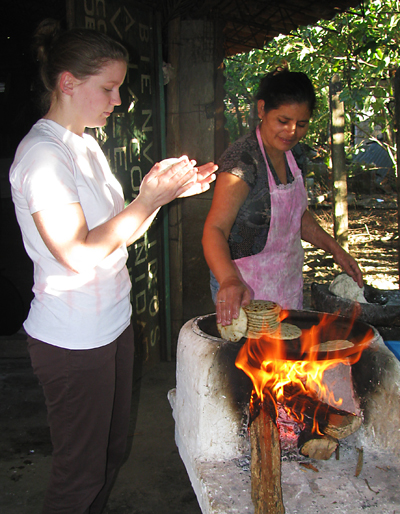About a month ago, I got a call from my dad. Somewhat spontaneously, he and Mark Menjivar, a photographer and family friend, decided to take a week-long trip to El Salvador and they wanted me to come with them, as a translator for my dad and assistant to Mark. So, I spent the week before Thanksgiving this year taking photographs, conducting interviews and sharing delicious food with the families of Valle Nuevo, a tiny village near the Honduran boarder.
Throughout the week, Mark, my dad and I met countless strong and inspiring individuals. I talked with groups of women who saw a need in their community – for a bakery or for a local market – and worked tirelessly until their goals were accomplished. I met with local youth who were planning a region-wide march – complete with skits, music and a mass – to commemorate the anniversary of a massacre that occurred nearby during the civil war. I heard one woman share her personal experience of hell – two year-old son shot in her arms; separated from her daughter and reunited 47 days later; starvation; no place to call home. I also saw countless examples of extreme poverty and in some places, in some conversations, was confronted with a terrifying sense of hopelessness.The members of the Directiva, the local leadership, are getting old and tired. “When we look to the future, all we can see is corn and beans,” said Juana. “The dream of the youth is to go to school and to make something of themselves. They don’t dream of staying here and working the land and we, as parents, understand that. This is a hard life and we’re poor,” said Pastór.
So, where does a community like Valle Nuevo, that has spent years fighting for their security and stability, go from here? They have accomplished so much in the last ten years – they’ve moved back to their land after years of living in refugee camps, and they have rebuilt stable, permanent homes. Progress seems to be slowing, though, and the danger of stagnation is very real. The community is aging, and the majority of the youth have dreams too big for the little village to contain.
During my week in El Salvador, I heard several people quote the well-known adage “those who forget their past are condemned to repeat it.” The people of Valle Nuevo, both young and old, are holding tightly onto their rich and difficult history, and I applaud them for that. However, I think that sometimes you just need to let go of some of the past in order to be able to move successfully into the future, and this can be a terrifying experience. Where would we be, though, if we didn’t continue to walk forward, not blindly but cautiously and confidently, into the terrifyingly beautiful unknown?
Emily Miller is a third year social work major.



